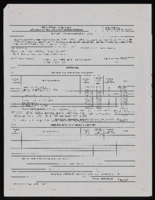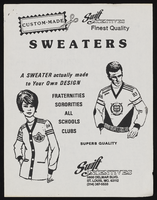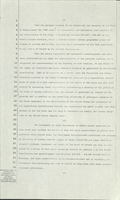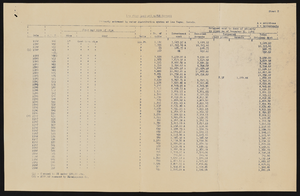Search the Special Collections and Archives Portal
Search Results

Interview with Bennie Reilley, Sr., May 10, 2004
Date
Archival Collection
Description
Access note: May not quote in any form without written permission from interviewee
Text

Cecia Alvarado oral history interview: transcript
Date
Archival Collection
Description
Oral history interview with Cecia Alvarado conducted by Barbara Tabach on September 15, 2020 for the Latinx Voices of Southern Nevada Oral History Project. Cecia describes her personal history, moving to the United States as a teen in the year 2000. She talks of immigration, education, and her work as the State Director of "Mi Familia Vota."
Text

Nathalie Martinez oral history interview: transcript
Date
Archival Collection
Description
Oral history interview with Nathalie Martinez conducted by Rodrigo Vazquez and Barbara Tabach on June 24, 2021 for Latinx Voices of Southern Nevada Oral History Project. Nathalie Martinez, one of the original members of the Latinx Voices project team, dicusses her personal history and the history of her parents who immigrated to the United States from Colombia and El Salvador. She shares her educational background and experiences working as an interviewer for the Latinx Voices project before its culmination and her graduation in 2021. Nathalie also talks about her work on the project's podcast and her work linguistically translating the interviews from Spanish to English.
Text

Edith Fernandez oral history interview: transcript
Date
Archival Collection
Description
Oral history interview with Edith Fernandez conducted by Marcela Rodriguez-Campo and Claytee D. White on September 27, 2018 for the Latinx Voices of Southern Nevada Oral History Project. In this interview, Fernandez discusses her upbringing in Las Vegas, Nevada and growing up in the Charleston Heights neighborhood. She recalls living in a predominantly white community, and the growth of Latinx families in that area. Fernandez talks about her educational experience in the city, her father's involvement with Culinary Worker Union Local 226, and identifying as a Chicana American. Later, Fernandez remembers her involvement with opening the Cambridge Center, working with the Latino Youth Leadership Conference (LVLC), and becoming the District Director for Representative Steven Horsford. Lastly, Fernandez discusses her role as the Associate Vice President at Nevada State College (NSC).
Text

Economic Opportunity Board of Clark County (Nev.) financial and budget reports
Date
Archival Collection
Description
From the Clark County Economic Opportunity Board Records -- Series I. Administrative. This folder contains financial memos and reports of the Clark County Economic Opportunity Board from January 1968 through June 1968.
Text

Transcript of interview with Liliam Lujan Hickey by Layne Karafantis, March 18, 2010, & March 25, 2010
Date
Archival Collection
Description
Liliam Lujan Hickey is best known in the state of Nevada for being the first Hispanic woman elected to the State Board of Education as well as for the enormous contributions she made while serving from 1998 to 2000. For this, an elementary school in Clark County bears her name. Despite many obstacles, Liliam has continually dedicated herself to standing up for the causes she believes in, such as providing preschool education to the underprivileged, preparing youth to enter the workforce, helping other Hispanics run for office, and proving that with enough courage anyone can accomplish their dreams. Born in Havana, Cuba in 1932, Liliam led a sheltered life that revolved mostly around her studies at a French Dominican school. She met her first husband, Enrique Lujan, when she was only sixteen and they wed soon after. Enrique was twelve years her senior, owned many casinos on the island, and provided a luxurious existence for Liliam and their three children. However, this lifestyle abruptly changed when Castro assumed power in 1959 and Liliam and her family were compelled to relocate to the United States. In Miami, Enrique assisted other refugees financially, hoping that his wealth would remain secure in Cuba. He was wrong. This left the family destitute. In addition to casinos, Enrique had been Cuba?s coach for the Olympics. He moved the family to York, Pennsylvania, where he hoped to find work at the York Barbell Company. Liliam, who had been accustomed to having maids and nannies in Cuba, found herself doing all the housework while she also worked in a factory. The change could not have been more dramatic and the living conditions became unbearable. The family chose to move to San Diego in a Volkswagen Minivan with the hope for a better life. The next few years brought many transitions. Things did turn around in San Diego, and Liliam she recalls her years in southern California as some of the happiest of her life. Liliam found a job working at the Scripps Clinic in La Jolla. After a few years, Enrique found a job in Las Vegas and the family moved again. In Las Vegas, Liliam gave birth to her fourth child, Mary, and life once again became financially difficult for the family. In 1972, the situation grew worse with Enrique?s untimely death. Liliam was a widow at forty years of age. She had to teach herself how to drive a car, write checks, and perform financial tasks that Enrique had insisted on managing while he was alive. Determined not to give up, however, she worked tirelessly to keep the family together. Amidst all this, a friend introduced Liliam to Tom Hickey, and after a brief courtship they were married in 1981. Within a few years, Liliam became active in politics, running for the State Board of Education. Her campaign manager advised her that voters would not be receptive to photos of a Hispanic woman on billboards, and to capitalize on the name “Hickey,” which was a recognizable name because her husband was an assemblyman. She took the manager?s advice and was elected in that campaign and for two more terms, the maximum limit for the office. After the first race, she proudly displayed her face on billboards across the state. During her time at the State Board of Education, Liliam dedicated herself to helping all children receive a better education in Nevada, not only Hispanics. She co-founded the Classroom on Wheels [COW] program, which brought buses to poor neighborhoods to provide pre-school education. She established Career Day, which pairs high schools students with business professionals in an effort to help them make the transition into the workforce. While the COW program is no longer running, 8 Career Day still operates and awards scholarships in Liliam?s name annually, which helps youth receive the educational opportunities they need to succeed. And she involved Hispanic youth in Boy Scouts by bringing ScoutReach to the Las Vegas valley. Lujan Hickey worked in a wide array of other community organizations. In the 1970s, she began to work with Circulo Cubano, which later became the Latin Chamber of Commerce, and she would later belong to the National Chamber of Commerce. A longstanding member of the League of Women Voters, Liliam saw the need to get Hispanics more involved in politics in the state. Her story is one of great inspiration, and when asked why she does it, she simply replies with a smile, “I love life.” Hickey?s narrative offers the reader a glimpse of the experiences of the Cuban refugee experience in the U.S. in general. Specific to Las Vegas, it provides a rare story of the experiences of early Latinas in the political and economic development of Las Vegas in the last half of the twentieth century.
Text

Sweater order forms
Date
Archival Collection
Description
From the Alpha Kappa Alpha Sorority, Incorporated, Theta Theta Omega Chapter Records (MS-01014) -- Chapter records file.
Text
Punam Mathur (Elaine Wynn Foundation) oral history interview conducted by Kelliann Beavers and Elia Del Carmen Solano-Patricio: transcript
Date
Archival Collection
Description
From the Lincy Institute "Perspectives from the COVID-19 Pandemic" Oral History Project (MS-01178) -- Community organization interviews file.
Text


